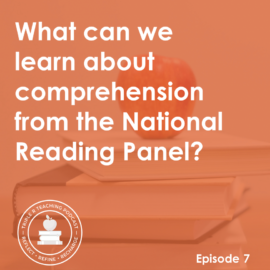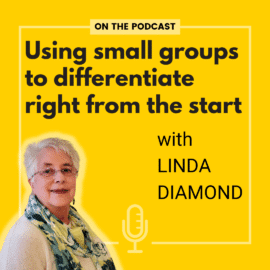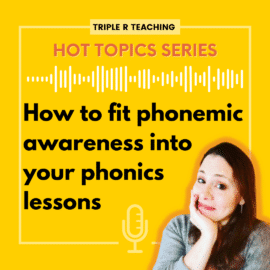
TRT Podcast#40: Should you use leveled or decodable books with beginning readers?
Leveled books are predictable books with strong picture support. Decodable books feature words whose sound-spelling patterns have been explicitly taught. Which are best for beginning readers?
Listen to the episode here
Full episode transcript
Hello! Anna Geiger here and I am joining you for another Facebook live video, which is going to become Episode 40 of the Triple R Teaching podcast. In this episode, we're going to talk all about decodable and leveled texts. Should you be using decodable books or leveled books with your young readers?
Last week, we talked about three-cueing. That was an episode that was hard for me to prepare and give because over the years I have relied on three-cueing when teaching young readers to solve words, but now I've learned that it is not the best approach for several reasons. Having kids solve words by using context clues or pictures, or just the first letter, is not a good idea because we're actually training them to do their reading work on the wrong side of the brain. Instead, we want them to do the reading work on the left side. We want them to connect the phonemes to the graphemes - the sounds to the letters, because scientists tell us that that's how kids are able to take what they're getting off the page and make it a part of their permanent sight vocabulary. That is words that they can recognize instantly, just like you recognize thousands and thousands of words by sight. You're not sounding out every word as you read, and that's where we want our students to get. In order to get there though, they have to sound out the words at first.
I know that as a teacher, I thought that I was doing it all correctly because I did teach phonics - we had phonics lessons. The problem is that when I moved my kids into their guided reading groups, I was using books that did not require them to use their phonics knowledge. Here's a quote from Wiley Blevins, "When students are mainly reading leveled text with predictable sentence structures, they're undervaluing and underusing their phonic skills." This creates a really bad habit. Every book they pick up, their first strategy is to try to look at the patterns, look at the pictures, or memorize. Decodable books encourage the right strategy of sounding out the words."
Now, if you're like me, you are very hesitant to switch from leveled books to decodable books. Today I want to talk to you very briefly about the difference between the two and why I believe decodable books are a great choice for beginning readers.
Leveled books typically use predictable patterns, and they require children to use pictures and context clues to solve many of the words. Because the books are predictable, a lot of times they see the same sight words or high frequency words over and over so that for some children, seeing them over and over allows them to remember those words. It doesn't work for everyone.
Here's an example of a leveled book. It's called, "My Map", and it says, "I made a map. I made streets. I made a house. I made a stop sign." You can see how that book is very predictable, and that if children can very quickly learn the pattern, "I made ___. I made____," then they can use the pictures to solve the words. Or for parts of the words they can use phonics.
For example, if someone is trying to read, "I made streets", they may not know that the word is streets, but if they look at the picture, they could say, "Oh, okay, I made s-streets". They could maybe figure it out, but you can see how there's a lot of guessing that has to happen. They probably don't have the phonics skills at this early level to sound out the word "streets" and particularly the word "house" on the next page. Most kids at a very early reading level don't know that "ou" spells /ow/. So in having kids use these leveled books, a lot of times what's happening is that they're developing habits of guessing instead of paying attention to all the letters in the words.
Now I use leveled texts for many years. I used them with my oldest kids when teaching them to read, and I did not believe that leveled texts were harmful because my kids could learn to read with them! I taught them some phonics and they were able to apply it to a lot of the other books they read. The problem is that many kids don't do that very well, and everyone will benefit from learning how to sound out words, because this will serve them as they get into higher levels of reading.
Many teachers tell us that they teach kids in third grade or higher and their students have learned those habits of looking at the pictures and thinking about what would make sense, instead of actually paying attention to the words themselves, and that at that age they hit a wall. Reading becomes very difficult, and when they try to read those longer words in their social studies or science textbooks, they don't have strong enough phonics skills to attack those words and then they have a problem.
So that's why with our youngest readers, we've got to put more focus on decodable text. Now, a decodable text is different for every child because a child beginning kindergarten is able to sound out something very different than someone who's in second grade, right? It depends on the phonics skills they've learned, so a book may be decodable for one child and not for another. It just depends on where they are in their phonics knowledge.
The definition of a decodable book is a book that contains phonics patterns that a child has already learned. Now is every single word in a decodable book decodable? Personally, I hope not because that means that kids aren't going to have words like, "the", and "of" that are really essential for making the sentences flow and making the text make sense. There are some authors of decodable books that have created them to be 100% decodable on purpose. I think that can be a problem, but I do think a substantial percentage should be decodable, maybe 60-80% on the high-end.
Now, if you're like me, you're thinking I don't want to use decodable books to start teaching early reading because they're boring, they don't sound right, and they're going to kill a love of reading. Those are things that I felt for a very long time. To be honest, it's probably fair that I thought that because the decodable books that came with my phonics series were really pretty bad. They were very small, all black and white - which doesn't have to be a problem, but the pictures were not engaging. And because the authors were so eager to make the books completely decodable, they had very stilted sentences and they just didn't sound right! They used words the kids never even heard of just to try to fit enough to decodable words in the text, so that comprehension really wasn't going to happen with those texts. I found them to be painful and a waste of time.
I have two things to say about that, however. Number one, there ARE quality decodable texts, and we're going to get into that. But number two, when you feel that what you're using really is important, you will do a better job with it. You will be more excited about it, and so will your students! So if you have a decodable text that you think, "Ugh, this is so boring and it doesn't make any sense at all. I hate it, but I guess I have to use it." It's going to show, right? So you need to educate yourself about why decodable books are helpful and you need to find good ones, and then you can use them with your students.
Next week, we're going to talk about how to find good decodable texts, like what are the qualities of a good decodable text, and I'm going to share with you my favorites. I just want to really quickly give you a comparison.
A few minutes ago, I read you an example of a leveled text. Here's a decodable text, I'll go ahead and start with one that I wrote. This is called, "I Camp". This would be a book for kids who can read CVC words and words with beginning blends and digraphs. It says, "I get my bag. I go on a path. I look at a map. I set up the tent. I sit and sip. I like to camp." So in this book, the words are very decodable. There are a few sight words that you'd want to teach like the words "to", "the", and "my", which maybe are not phonics patterns that the child knows yet, but overall, they can sound out the words.
And you could ask questions about this book! You can say, what does the boy do when he goes camping? Why do you think he's looking at a map? I think you want to make sure that the decodable texts you choose actually have something that can be discussed! If it's a whole bunch of random sentences, just to get lots of phonics practice, then you're probably better just reading random sentences than reading them in a book. When we read a book, we should be able to identify what it's all about and answer questions about it. If it's just random words, then we may also be doing a different kind of damage to our students. We may be teaching them that reading doesn't have to make sense.
As I talked about last week with three-cueing, while we don't want kids to use the three-cueing method to solve words, we do want them to monitor. If they're reading a word and they finish the sentence, and it sounded funny or didn't make sense, we want them to go back and read it again and correct it. So first they're sounding out the words, but we want them to be able to go back and correct. If it's a phonics book or decodable book that mixes up word tenses all the time and is very awkward - because the authors don't want to use certain words - then kids can't self-correct because it all sounds strange!
I also, before we close today, want to talk to you a little bit about leveled books and if there is a use for them in the primary classroom. So I've told you before that in the past, I taught reading using leveled books, and those would be the Fountas and Pinell guided reading levels, typically from A and up. My very early readers would use very predictable books and use pretty much only picture cues. As they moved further along, they would use more phonics cues as they could.
I no longer believe that those are a good choice for beginning readers because you've really got to teach kids the HABIT of sounding out words. That is so important and you want them to be able to always look at the words first, and then look at the picture second. When I started teaching my youngest to read a few months ago, I started teaching him the way I taught his older siblings, where I taught with leveled texts, and I noticed that his eyes were jumping off the words. As soon as he figured out the book's pattern, he was looking just at the picture, and he wasn't looking at the words at all!
At that same time I was starting to read a lot about the science of reading, and I decided right away I would try something different. I would make the shift and I would just use decodable books with him. As he started using decodable books, it was just very different. Instead of opening the book and going right to the picture, his eyes would go directly on the words. He would sound them out, and then when he was done, he would study the pictures and ask me questions about the book. So he has learned that the text is where we start, and I think that's really, really key!
Now you may be resisting this idea of decodable texts because you might be thinking, well, how long do we have to do this? Is that all my students can read? That sounds boring! I have wrestled with this for a long time, and here is where I've landed. I think that kids should be using decodable texts in reading instruction until they have a strong phonics knowledge and for sure until they solve words by reading them - by looking at the letters - not by looking at pictures and thinking about what would make sense.
If you notice that kids are switching to leveled texts, but now all of a sudden are not using the phonics skills they've learned, then you need to go back to decodable text. Some teachers will tell you that kids should be in only decodable until second grade, and some will say maybe spring of first grade. It concerns me a little bit thinking about going all the way to second grade, but there may be students for whom that is necessary. If you're thinking that is going to kill the love of reading, if that's what they have to read, I encourage you to think about it in a little bit of a different way as I have been - the thing that builds a love of reading is success with reading.
If you are giving kids leveled books where they have to use pictures and they have to use context to solve the words, they know they're not really reading them because they can't read the words in isolation. It's hard to build confidence with reading that way. On the other hand, if you give a kid a very simple book that they can sound out with success, and they get faster and better, that's where the love of reading comes, with knowing they can do it!
There are lots of good decodable books out there, and we're going to get to those next week. If you have any questions, leave them below this video on Facebook or in the podcast comments. When the podcast is published you can find it at themeasuredmom.com/episode40. Thanks for joining me! Next week, we'll be talking about how to find the best decodable books for your learners.
Sign up to receive email updates
Enter your name and email address below and I'll send you periodic updates about the podcast.
Link to original Facebook Live presentation
Check out the full science of reading bootcamp
- Introduction to the series
- Episode 1: What are the reading wars?
- Episode 2: My reaction to the article that reignited the reading wars
- Episode 3: How the brain learns to read
- Episode 4: What the science of reading is based on
- Episode 5: What’s wrong with three-cueing?
- Episode 6: Should you use leveled or decodable books?







[…] Each lesson has a clear focus on spelling pattern / sound focus. The passage is a decodable text which children up to Grade 1 should be practicing reading consistently (article here) […]